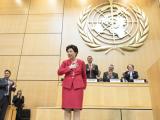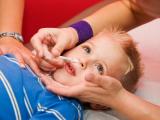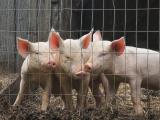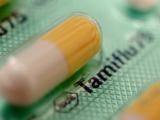Sep 17, 2009
Flu cases up 21% on campuses
In its surveillance of flu-like illnesses for the week ending Sep 11, the American College Health Association (ACHA) reported 6,432 cases at 253 schools, a 21% increase from the previous week. Though the report doesn't include flu subtype, federal officials have said 98% of circulating flu viruses are the pandemic strain. Cases slowed in the southeast but increased elsewhere, particularly in Mid Atlantic and Midwestern states.
http://www.acha.org/ILI_LatestWeek.cfm/?date=091709
Sep 16 ACHA surveillance report
US, others donate pandemic vaccine
The Obama administration today announced that the nation will donate 10% of its pandemic vaccine supply as supplies become available to help stop the global spread of the virus. The news follows reports that most people may need only one dose of the vaccine, which will greatly boost the nation's stockpile. Australia, Brazil, France, Italy, New Zealand, Norway, Switzerland, and the United Kingdom have also joined the donation program, which will go through the World Health Organization.
http://www.whitehouse.gov/the_press_office/President-Announces-Plan-to-Expand-Fight-Against-Global-H1N1-Pandemic/
Sep 17 White House press release
Similar H1N1 strain may explain 1-dose effectiveness
The unexpectedly robust response to just one dose of pandemic H1N1 vaccine in research subjects might suggest that the vaccine boosts preexisting immunity to a similar strain that has circulated since 1977, New Scientist reported today. Experts say other factors could also play a role, such as a slight priming effect from seasonal flu vaccination or a priming effect on the cell-mediated immune system from previous seasonal flu infections.
http://www.newscientist.com/article/mg20327266.000-mystery-immunity-could-boost-swine-flu-protection.html?DCMP=OTC-rss&nsref=online-news
Sep 17 New Scientist story
Canada sets pandemic vaccine priorities
The Public Health Agency of Canada (PHAC) yesterday announced priority groups to receive the country's first pandemic H1N1 vaccine doses. They include those under age 65 with underlying health conditions, pregnant women, children ages 6 months to younger than 5 years, people in remote or isolated communities, frontline healthcare workers, and household contacts of high-risk groups. The government is urging provinces to use the guidance based on local conditions.
http://www.phac-aspc.gc.ca/media/nr-rp/2009/2009_0916-eng.php
Sep 16 PHAC press release
UK sees signs of 2nd pandemic wave
British health officials said today that surveillance data show a slight increase in pandemic H1N1 cases, which might herald the start of a second wave of infections, the London Telegraph reported. Suspected outbreaks have been reported at six schools, though there are no closure plans. Scottish officials also reported a rise in novel flu cases.
http://www.telegraph.co.uk/health/swine-flu/6202318/Swine-flu-second-wave-on-way-as-number-of-cases-in-England-rises.html
Sep 17 London Telegraph story
Lab clue led researchers to immune therapy
A Melbourne scientist who recently presented a study on the use of immunoglobulin in severely ill H1N1 patients said a colleague first considered the therapy when evaluating the lab work of a rapidly declining hospitalized patient, the Canadian Press reported. Doctors noticed the patient had low IgG2 antibody levels after ordering tests on all H1N1 patients in the intensive care unit. They said IgG2 deficiency might explain why some patients become severely ill.
http://www.google.com/hostednews/canadianpress/article/ALeqM5icleN_u1gqVocAlyuj48dD91QwKA
Sep 16 Canadian Press story




















